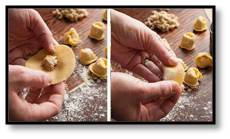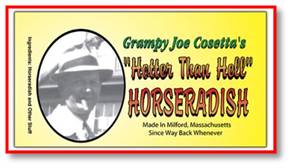Monday Author: Susanne Skinner
“Life without traditions is as shaky as a fiddler on the roof.” ~ Tevye
I did not grow up in a family with a long list of traditions. We had a few, but nothing embedded from past generations to be brought forward year after year. Looking back, I wish we had. My Dad was in the military and we had a very mobile life. An established tradition or two would have been nice. No matter where we lived we would have had something that was us.
I love tradition. I married into a family with inherited traditions complete with stories of their origin, and I made them my own. I took memories from my extended family—favorite recipes and anecdotes—and added them to the mix. As our family expanded new ones were easily added. Once you have children and you do something more than once, the kids expect it and the next thing you know—tradition!
Our children are grown, but traditions bring us together during holidays and special occasions. They link past generations with current ones and have inspired our children to start traditions of their own. Many of our traditions center around Easter and Christmas and we’ve had the joy of watching them expand as each person adds a unique element to the celebration.
Most family traditions were rooted in necessity. Necessity became nostalgia, and eventually it was a way for families to celebrate and connect during holidays. Over time, the family model has evolved and changed. Consider our lives today. Families are often disconnected by distance, work and travel schedules. We have less time to enjoy things that were once part of everyday family life.
There are single-parent families, same-sex families, blended families and intergenerational families. In our house, five children with jobs, diverse schedules and significant others means that even a family dinner requires coordination. Something as simple as a family weekend requires intense organization and advance planning. Everyone contributes and we make it work.
My husband’s family traditions anchored the children and grandchildren. For the most part, parents and grandparents were in the same town, which meant cousins and eventually grandchildren were as well. It made for large gatherings and perpetuated the wonderful traditions we have today. His grandparents celebrated two holiday traditions that our kids not only look forward to, but actively participate in. They are talked about, planned, and put on calendars so that all parties are available.
Just before Easter the purchase of horseradish roots heralds the impeding gathering that will take place in our kitchen. The men will make horseradish for our Easter gathering. This is a process rooted in tradition, from methodology to testing and finally the packaging and labeling. My husband’s grandfather is credited with passing down the recipe; hence the name Grampy Joe’s Hotter than Hell Horseradish graces each jar.
When I say men, I include our three boys, cousins, uncles, boyfriends, roommates, in-laws and anyone else remotely connected to the family and male. The list grows longer each year. The ritual begins with peeling, chopping, grinding and processing 10 pounds of horseradish so pungent the windows and doors are open in March. Once made, it is tested on hard-boiled eggs and grilled kielbasa. The first one to break a sweat is called out as a wimp. The end result will fill around 15 jars and is announced with the phrase “Grown men have cried; the horseradish is made”.
 When I met my husband I was introduced to the tradition of Italian cappeletti, a tiny meat-filled dumpling served in soup at Thanksgiving and Christmas. Family competitions are fierce—who can make the most in a single round (the record is close to 1000) followed by how many you can eat.
When I met my husband I was introduced to the tradition of Italian cappeletti, a tiny meat-filled dumpling served in soup at Thanksgiving and Christmas. Family competitions are fierce—who can make the most in a single round (the record is close to 1000) followed by how many you can eat.
Production begins before Thanksgiving with a seasoned pork and chicken filling. Pasta dough is rolled and cut into one-inch circles using a special tool my father-in-law made for each of his children. The circle is filled and folded in the shape of a little hat or cappeletti. They are served in turkey broth and are the favorite part of the dinner. Our son Nathan holds the record for cappeletti consumption.
The thing about tradition is that it doesn’t happen from a single occurrence. It is only tradition if it happens over and over again. After our parents and grandparents passed away, these two traditions became somewhat sporadic until their children decided to make them regular events.
We enjoy them for what they are but also for what they represent. They are the glue that binds our families together and the compass that guides us back to something larger than each of us individually. Traditions assume deeper meaning in the context of bringing together and celebrating our family and our heritage.
Passing the Torch
We love our traditions. We consider them a family responsibility and work hard to preserve them and pass them down. They underwrite three generations of my husband’s family and are intertwined with new ones added over the years. My husband and I look forward to the day when horseradish and cappeletti are made by our kids’ families and we’re invited to help. They know how it’s done!
- Comfort: It’s the familiar. We know what to expect because we have done it for many years. No surprises, just fond memories built upon the years before and the anticipation of the next time we meet. It’s a security blanket we wrap around ourselves until we are together again.
- Togetherness: Our families love to get together and celebrate. We enjoy each other’s company, the ever-expanding circle that is our family, and the pride we have when we honor traditions started by loved ones no longer with us physically, but always with us in spirit. It’s the stuff laughter is made of.
- Belonging: Traditions remind us where we came from. Even though I did not grow up with a lot of them, my extended family has been folded in and embraced by my husband’s family and together we have created traditions of our own. The circle widens with the passing of time. We look forward to the arrival of Grandpa Sam for Christmas—a relatively young tradition that began when my mom died 12 years ago and one that means a great deal to all of us now.
Traditions are really just family heirlooms. They have been handed down to us by our families, often without invitation. Some you embrace and make your own; impossible to imagine your lives without them. Some you’re stuck with and learn to love them for the simple reason that they are yours.
The fact that a tradition has been handed down through generations proves something. They work. They remind us where we came from and who we are.
|
All tradition is merely the past. ~ Jiddu Krishnamurti |



“Tradition is merely another form of laziness.” Leopold Stokowski